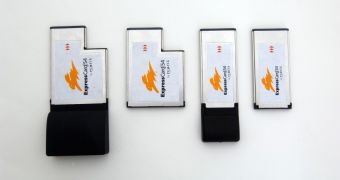PCMCIA announced, at CeBIT, that it is on its way to upgrading the ExpressCard Standard 1.2 to a more reliable and high performance product which would come to meet the growing needs for speed in the world of mobility. As PC card slots are to be found in most of the notebook computers, this is a necessary step forward for today's high performance mobile technologies.
The performance of the new ExpressCard Standard 2.0 will be significantly increased. The data transfer rate speed between card and computer will rise up to 5Gb/s, which is double the speed of the currently used ExpressCard Standard 1.2. The transfer rate of the USB 3.0 (SuperSpeed USB) can reach only a speed of 4.7Gb/s, so the ExpressCard Standard 2.0 is expected to be a little bit faster.
The new ExpressCard Standard will support USB 3.0 as well, allowing the card reader devices to be updated to the bus technology, so that the computer will see the sticks as Mass Storage devices. Also, the compatibility with the older ExpressCard products is promised to be maintained. Yet, manufacturers will be compelled to develop better products for their consumers.
As the new ExpressCard Standard will be USB 3.0 compatible, depending on the protocol used, the transfer rate speed will range from two to ten time higher than the 1.2 version of the ExpressCard Standard or the Hi-Speed USB. Many applications will benefit from this improved performance. Some of them are SATA (Serial Advanced Technology Attachment) 2.0, high performance streaming media adapters or very high performance flash memory storage devices.
"We are inviting all ExpressCard product developers to join in our activities as we formalize the requirements of the new standard," said Brad Saunders, chairman, PCMCIA. He also encouraged developers to create new innovative products in compliance with these performance improvements and to provide feedback and active responses for more improvements.

 14 DAY TRIAL //
14 DAY TRIAL // 
